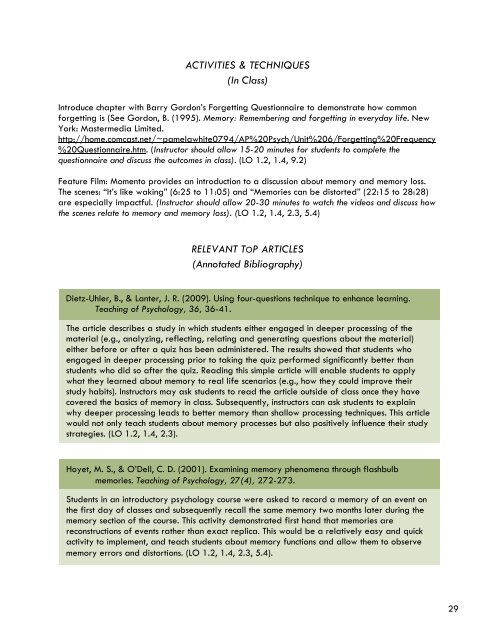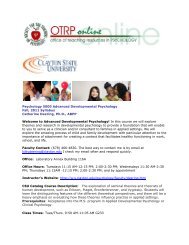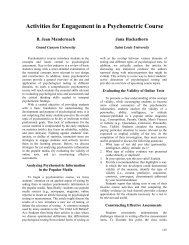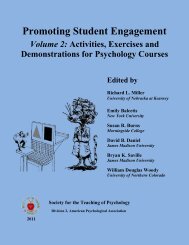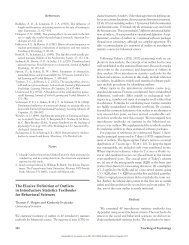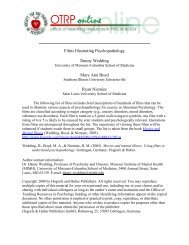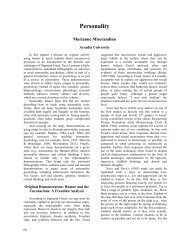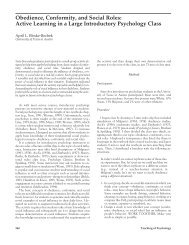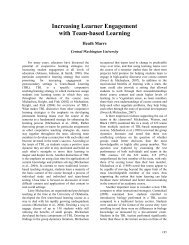INTRODUCTORY PSYCHOLOGY TEACHING PRIMER Early Career ...
INTRODUCTORY PSYCHOLOGY TEACHING PRIMER Early Career ...
INTRODUCTORY PSYCHOLOGY TEACHING PRIMER Early Career ...
Create successful ePaper yourself
Turn your PDF publications into a flip-book with our unique Google optimized e-Paper software.
ACTIVITIES & TECHNIQUES<br />
(In Class)<br />
Introduce chapter with Barry Gordon’s Forgetting Questionnaire to demonstrate how common<br />
forgetting is (See Gordon, B. (1995). Memory: Remembering and forgetting in everyday life. New<br />
York: Mastermedia Limited.<br />
http://home.comcast.net/~pamelawhite0794/AP%20Psych/Unit%206/Forgetting%20Frequency<br />
%20Questionnaire.htm. (Instructor should allow 15-20 minutes for students to complete the<br />
questionnaire and discuss the outcomes in class). (LO 1.2, 1.4, 9.2)<br />
Feature Film: Momento provides an introduction to a discussion about memory and memory loss.<br />
The scenes: “It’s like waking” (6:25 to 11:05) and “Memories can be distorted” (22:15 to 28:28)<br />
are especially impactful. (Instructor should allow 20-30 minutes to watch the videos and discuss how<br />
the scenes relate to memory and memory loss). (LO 1.2, 1.4, 2.3, 5.4)<br />
RELEVANT TOP ARTICLES<br />
(Annotated Bibliography)<br />
Dietz-Uhler, B., & Lanter, J. R. (2009). Using four-questions technique to enhance learning.<br />
Teaching of Psychology, 36, 36-41.<br />
The article describes a study in which students either engaged in deeper processing of the<br />
material (e.g., analyzing, reflecting, relating and generating questions about the material)<br />
either before or after a quiz has been administered. The results showed that students who<br />
engaged in deeper processing prior to taking the quiz performed significantly better than<br />
students who did so after the quiz. Reading this simple article will enable students to apply<br />
what they learned about memory to real life scenarios (e.g., how they could improve their<br />
study habits). Instructors may ask students to read the article outside of class once they have<br />
covered the basics of memory in class. Subsequently, instructors can ask students to explain<br />
why deeper processing leads to better memory than shallow processing techniques. This article<br />
would not only teach students about memory processes but also positively influence their study<br />
strategies. (LO 1.2, 1.4, 2.3).<br />
Hoyet, M. S., & O’Dell, C. D. (2001). Examining memory phenomena through flashbulb<br />
memories. Teaching of Psychology, 27(4), 272-273.<br />
Students in an introductory psychology course were asked to record a memory of an event on<br />
the first day of classes and subsequently recall the same memory two months later during the<br />
memory section of the course. This activity demonstrated first hand that memories are<br />
reconstructions of events rather than exact replica. This would be a relatively easy and quick<br />
activity to implement, and teach students about memory functions and allow them to observe<br />
memory errors and distortions. (LO 1.2, 1.4, 2.3, 5.4).<br />
29


